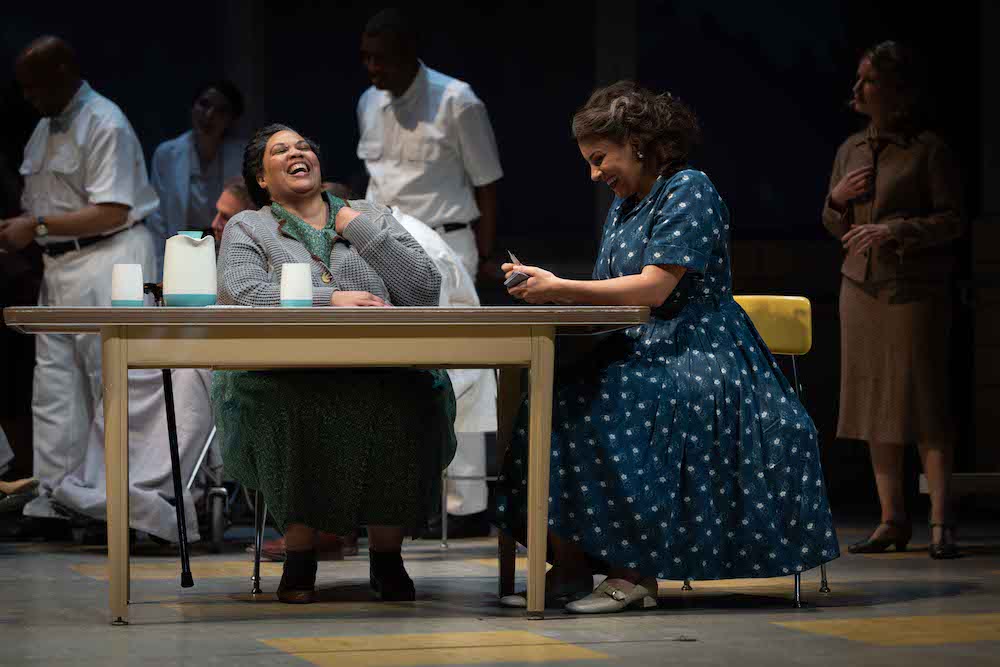Strong cast, evocative score bring Oliver Sacks’ “Awakenings” to operatic life

Odyssey Opera presented the East Coast premiere of “Awakenings,” based on the Oliver Sacks memoir, on Saturday night at Boston’s Huntington Theatre. Photo: Kathy Wittman/Ball Square Films
Oliver Sacks’ memoir Awakenings has already been adapted as an Oscar-nominated movie and a play. So why not an opera?
The idea was, in fact, the author’s: He suggested a theatrical reworking of the book to composer Tobias Picker, though it wasn’t until after Sacks’ death in 2015 that Picker set pen to paper. Finished in 2019, Awakenings had its East Coast premiere at the Huntington Theatre on Saturday night, courtesy of Odyssey Opera and artistic director Gil Rose.
Less a gripping drama than a tableau-like meditation on the limits of love, science and good intentions, Awakenings tells the story of Sacks and his late-1960s efforts to rehabilitate victims of the mysterious encephalitis lethargica pandemic.
Set in the Bronx hospital where he then worked, the opera dramatizes Sacks’ work. Using the drug L-DOPA, he dramatically improved the conditions of over twenty patients who’d been catatonic for decades. But unforeseen side effects soon emerged, the treatments were discontinued, and his charges eventually all slipped back into their earlier states.
Aryeh Lev Stollman’s libretto focuses on just three of the twenty-plus subjects of the L-DOPA experiments: Leonard Lev, Miriam H., and Rose R. Each character is firmly etched in an opera that treats both Sacks and his patients with sympathy and understanding.
Leonard, in this telling, is a now-middle-aged man overflowing with adolescent desire for his nurse, Mr. Rodriguez. Miriam mourns her lost daughter while Rose recalls, in fits and starts, her husband.
Sacks, only desiring the best, has brought them all back to life, though he’s meddling with powers far beyond his control, as soon becomes apparent. Even so, his colleagues and the press marvel at the program’s early successes while Sacks’ superior, Dr. Podsnap, worries and seethes.
Picker’s score shifts between stately diatonic episodes and pungent chromaticism. In both modes, it often alludes to dance forms, particularly the waltz. Each of the opera’s several scenes – and they’re all neatly delineated across its two acts – inhabits a particular musical world and, as the piece unfolds, a kind of arch form emerges.
Saturday’s performance strode confidently, if not always cleanly, from one sequence to the next.
Picker’s vocal writing in Awakenings doesn’t shy away from the whole range of the human voice: He writes as vigorously for its dusky registers as for its glowing ones. The results are often compelling, though sometimes frustrating.
Baritone Jarrett Porter’s account of Sacks, for instance, was broadly ruddy and noble. Yet the low-tessitura writing sat uncomfortably in his instrument even when it wasn’t being covered by the orchestra. Then again, ease wasn’t always the point: Sacks’ wrenching Act 2 aria didn’t stint on thematic or musical intensity.
Nor did soprano Adrienne Danrich’s account of Miriam H. A few low notes notwithstanding, Danrich delivered some of the night’s finest singing, radiant and commanding – especially in her duets with soprano Joyce El-Khoury’s Rose R. Indeed, these ladies evinced a winning chemistry, both hilarious and heartbreaking, in their various interactions.
Tenor Andrew Morstein tackled the role of Leonard with precisely the fearlessness it demanded, while tenor César Delgado’s resonant Mr. Rodriguez was, in spots, a touch too big for the space. Meanwhile, bass-baritone Keith Klein’s stentorian Podsnap came across as a righteous villain and mezzo-soprano Katherine Goeldner, singing Leonard’s mother, provided the story its moral center.
Some tentative moments in the latter stages of Act 2 aside, Gil Rose led the Boston Modern Orchestra Project in the pit with his customary vigor. The Odyssey Opera Chorus, prepared by Holly Druckman, executed their part with brio.
Allen Moyer’s simple sets made the most of the small stage: six moving glass panels effectively illuminated individual patients’ rooms and Sacks’ office, among other spaces. Projections of various images – a botanical garden, newspaper headlines, cityscapes – further located the opera’s settings.
James Robinson’s stage direction was commendably fluid and uncluttered, the cast doubling with admirable efficiency as stagehands. Meanwhile, James Schuette’s late-’60s-era costumes brought, when appropriate, welcome bursts of color to the hospital’s otherwise drab environs.
The production has, or raises, some issues: The fairy-tale framing of Sacks’ quest risks shrouding a horrifying and largely unknown pandemic in myth; a few scenes dragged; and the libretto’s unrequited-love storyline between Sacks and Mr. Rodriguez ultimately felt heavy-handed. But the larger message of Awakenings was timely and haunting: What one can and should do aren’t always the same, and even the best motives might have perilously unintended consequences. Awakenings leaves the question of how to act on that knowledge artfully and tantalizingly open.
The Boston Modern Orchestra Project plays music by Andrew Norman, Lei Laing, and Lisa Bielawa at 8 p.m. on April 15 at Carnegie Hall. bmop.org
Posted in Performances

Posted Feb 26, 2023 at 12:37 pm by Jesse Martin
It was a pleasure to be part of this terrific work.
Terrific cast and production.